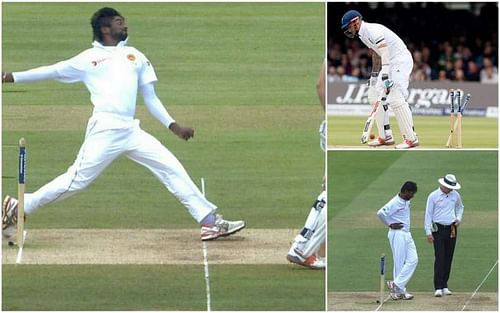
Controversy erupts between England and Sri Lanka over faulty ICC rule

There was drama of epic proportions during the fourth day’s play in the final Test between England and Sri Lanka at Lord’s, centering around a cricket rule that is set to be tabled for discussion at ICC’s annual conference later this month.
Umpire Rod Tucker was victim to ICC rules, his decision in the 46th over of England’s 2nd innings giving Alex Hales an undeserved life on 58, and eventually proving to be a turning point in the match. Hales went on to score 94, and England stretched their lead by 101 runs after that, taking a consolation win almost out of Sri Lanka’s grasp.
With England at 132/6 and leading by just 260, Alex Hales received what must have been the most controversial reprieve of his career. He would almost go on to make his maiden Test century as a result.
In the 46th over, a delivery from Nuwan Pradeep kept low and bowled Hales. Umpire Tucker, however, had called the ball a no-ball. Pradeep stood sulking near where his foot had landed, and the umpire joined him in trying to spot where his foot had landed as well. Replays on the giant screen showed that Pradeep’s front foot had in fact been marginally behind the line, and many expected that Hales would have to walk.
However, this is where the rigidity of ICC’s rules can be called into question. While officials can call on the TV umpire to check if fair deliveries are legal after a wicket, there is no recourse if the no-ball has been called by the on-field umpire himself. This is based on the logic that a batsman can change his shot in the split second after he hears the umpire’s call.
Even with honest intentions, there was no way for Tucker to overturn his decision, his hand tied by the rule book.
Sri Lanka camp seethes in anger
The umpire has apologised since then, but there has been a lot of anger seething in the Sri Lanka camp because they feel a precious win at Lord’s has been denied to them. Alex Hales has supported Tucker, saying, “I have sympathy with Rod Tucker, when you think how fast the game moves and how close it was. He told the bowler he was getting close. It’s a split-second decision.”
The Lankan perspective on the incident has been more unforgiving. The visiting team unfurled their flag on the Lord’s balcony, and were told by the ground officials to take it down.
Sri Lanka’s Board President Thilanga Sumathipala has said that whatever happened was ‘unacceptable’, and that he will complain to ICC. Sri Lanka coach Graham Ford visited match referee Andy Pycroft for an official explanation, and has rued the fact that technology is still not used enough, or appropriately enough, in cricket.
The President said, “The flag is a symbol. It is a mark to say we are not happy with the decision. To show solidarity and fight back.”
With 330 runs to chase down for this victory on the fifth day, Sri Lanka can be expected to pour out all their anger on the field of play as well.
Varying reactions to the no-ball incident
Hales’ county team said that Hales had been bowled because he had heard the call before going into his shot.
Some pundits have claimed surprise at Tucker’s confidence.
Some opinions expressed frustration with how a rule could override common sense based on the situation.
The most sensible comment on the issue probably came from Harsha Bhogle, who reiterated how these injustices have a tendency of balancing themselves out between teams.